Parents tend to get shortchanged in dramatic genre stories, but that just makes the inspiring ones all the more noticeable! So today, the Tor.com office is recalling its favorite dads (and others who fill that role) in science fiction, fantasy, and anywhere! You know who they are. They’re the guys who stuck around to serve as inspiration and support to their (often heroic) children… and who managed to survive the dramatic whims of their creators!
Benjamin Sisko (Star Trek: Deep Space Nine)
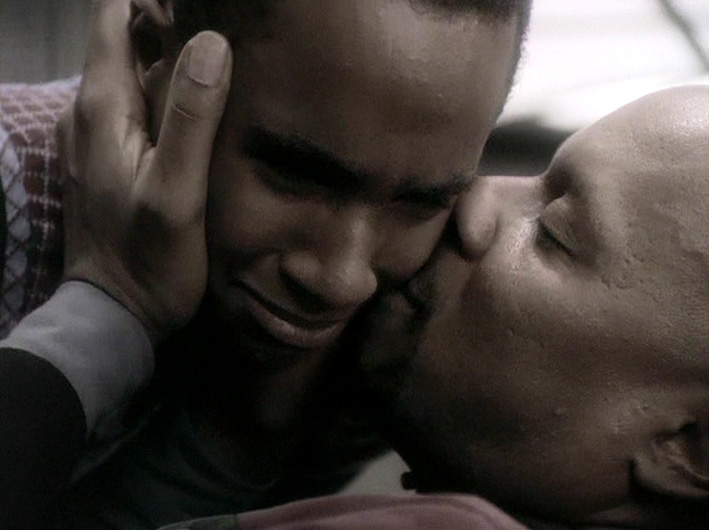
Star Trek: Deep Space Nine opens with Benjamin Sisko fighting for his family amongst the backdrop of the adventures of Captain Picard and the Enterprise crew, and over the course of seven years and a war that spans the galaxy, the show never loses sight of what is truly important to Captain Sisko: his family, and his son Jake.
“That was something else you still don’t often see on air, at least as it concerns black and brown men and their sons,” actor Avery Brooks told Nashville Scene in 2012. “We got to play complicated, emotional and intricate scenes, and we got to have tender and fun moments. It wasn’t a pat relationship or an easy one, and it was very realistic.” Portraying a solid, loving relationship between father and son was so important to Brooks that he altered the ultimate fate of his character. Instead of ascending into demi-godhood forevermore, as was the original intent of the show finale, Ben Sisko tells his new wife and their unborn child that he will never abandon them. –Chris
Arthur Weasley (Harry Potter)
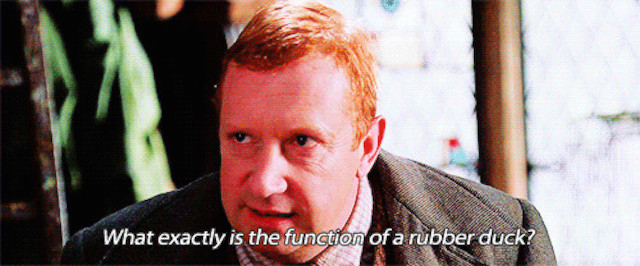
Talk about one of the best dads out there in sci-fi/fantasy! Arthur Weasley always loved his family, and protected them in the darkest of times during both the First and Second Wizarding War against Voldemort and the Death Eaters. Arthur clearly takes joy and purpose from his brood of Weasleys, working long hours to support them, and welcoming his children’s friends and significant others into the home, even if they didn’t have quite enough to go around. He may have been financially poor, but he’s clearly one of the richest fathers in all of SFF. (Even Rowling couldn’t bear to kill him off. And she tried.) –Bailey
Stoick the Vast (How to Train Your Dragon)
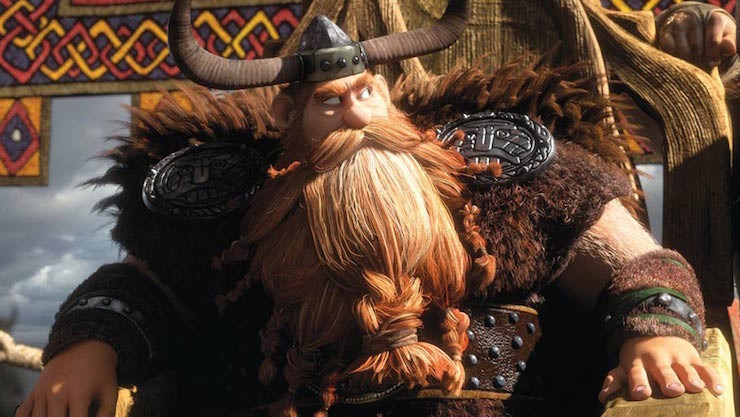
Stoick was a good Viking, strong, kind, a leader to his people, and also rather stubborn. Throughout most of Stoick’s life, he was what was expected of him (see: qualities listed above). But although he became angry when his Viking son seemed to side with their enemies, the dragons, Stoick had the depth of character to step back and rethink the origins of his stubborn attitudes. What was more important to him: understanding his son’s empathy for others, or upholding tradition? Stoick makes the right choice in the end, and the support that Hiccup receives from Stoick ends up changing the course of their entire world. –Bailey
Rupert Giles (Buffy the Vampire Slayer)
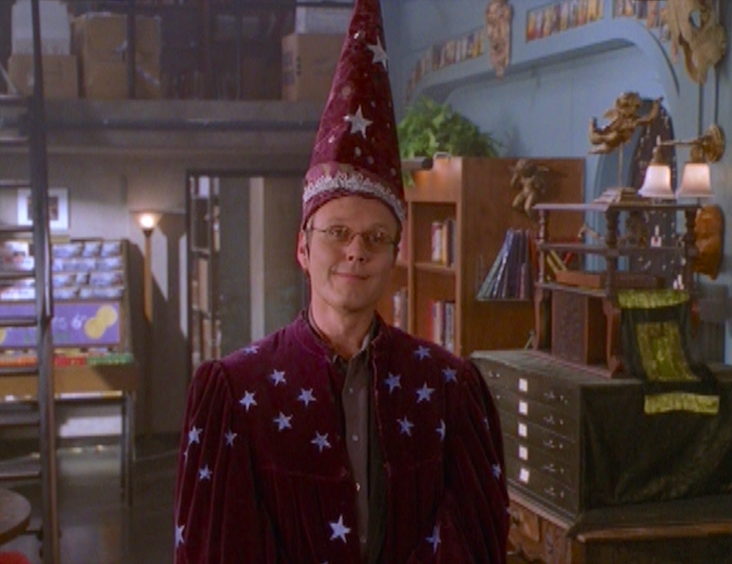
Thanks to George Michael, the phrase “father figure” will always evoke a certain ’80s pop hit. But how about instead of a pop star we think of Rupert Giles: Watcher extraordinaire, and father figure not just to Buffy, but to the whole Scooby Gang? Just thinking about Buffy’s speech in the first season finale, “Prophecy Girl,” can still just about bring me to tears, and part of the reason for that is Giles’ response. He can’t just be her Watcher, because he loves her, and she doesn’t just want to be the Slayer. She wants to live. From then on, their relationship is one of the pillars that holds up the show. Bit by bit, Giles is portrayed as more complex, more and more his own person, full of secrets, with a past full of meaningful choices, both good and bad. He saves Buffy, he infuriates Buffy, he tries to teach her everything he can—and he reminds her that adulthood is as varied and strange as it is inevitable. As someone who grew up with a deeply influential stepfather, I love all these things about Giles, but most of all I love the way Giles’ flaws and his brilliance and his love all work together to make him the person he is. Perfection isn’t required. Honesty is. –Molly
Tam al’Thor (The Wheel of Time)
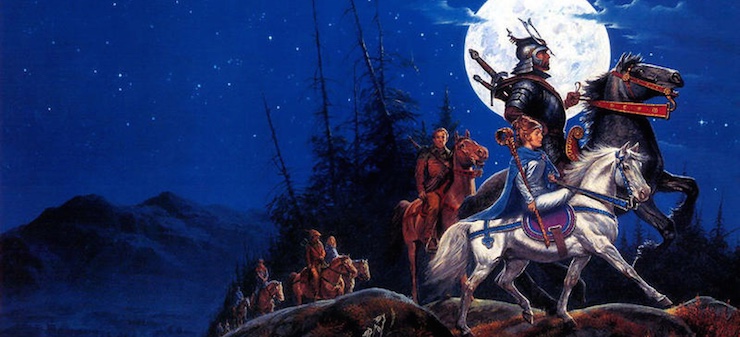
Tam, the father of The Wheel of Time’s prophesied savior Rand al’Thor a.k.a. The Dragon Reborn a.k.a. He Who Comes With the Dawn a.k.a. Lord of the Morning a.k.a. That Guy Who Gets Really Isolated and Angry and Weird as The Series Goes On has only a brief onscreen presence in the 14-volume series, but the care and love we see how him show Rand underpins Rand’s entire journey from farmboy to savior. Over the course of the epic, Rand grapples with his conscience as much as he grapples with monstrous light-consuming evil, and he slowly goes mad over the course of the series as a result. Giving in to the madness, giving in to the Shadow and becoming a tyrant, is an option offered repeatedly offered to Rand, and one he repeatedly rejects. The kindness and honesty that Tam instilled in young Rand is that much a part of his core being; a constant representation of the good that will be lost should Rand give in to darkness. And when it seems that Rand is finally about to give in to the Shadow, it is Tam who reappears and pulls him back. In the end, Rand saves the world, but only because his father Tam makes him into a man capable of saving an entire world. –Chris
Sully (Monsters, Inc.)
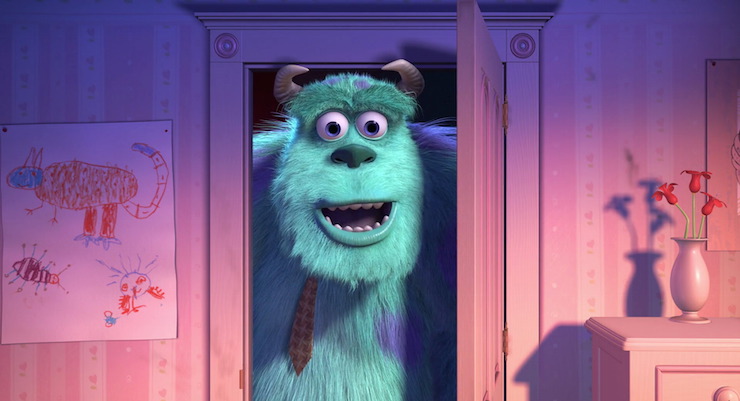
Though not Boo’s biological father, Sully surprises both the audience and himself by stepping into that role when Boo accidentally wanders into the Monster World. In her, Sully finds the inner strength to stand up to an entire society—and his best friend Mike Wazowski—and insist that they look beyond their routines and prejudices do the right thing. Sully becomes Boo’s unwavering protector, and it rips his heart in half to let her go, much as it does any loving father when they usher their child out into the world.
Sully’s growth into a great father is all there in the final frame of the movie. That smile. That smile. That is pure parental joy. –Bailey
Marlin (Finding Nemo)
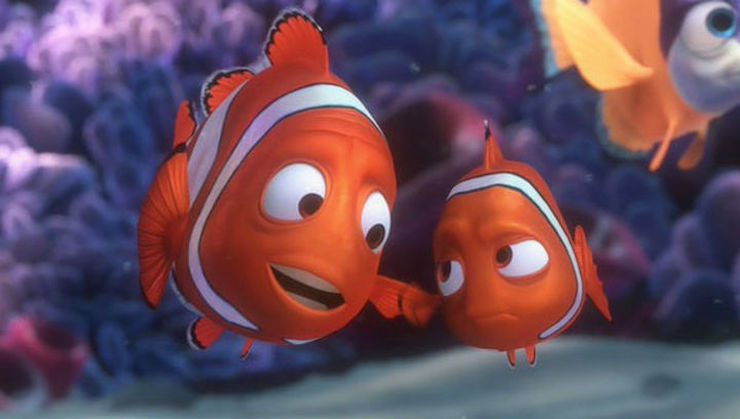
If we’re talking about Pixar, we need to mention Marlin from Finding Nemo. At first, Marlin’s a real downer. It seems like he’ll never be able to see past his kid’s disability (in this case, Nemo’s “lucky fin”). But there’s more to it than that, of course. Marlin is neurotic because he knows how easy it is to lose a child, and that gets translated as a hyper-focus on Nemo’s fin. Marlin brings a lot of emotional damage into the father/son relationship, but he’s exceptional because he’s always trying to not let his anguish become a permanent shadow upon his son’s life. He doesn’t always succeed, but when he does, it is spectacular to behold. –Natalie
Jim Gordon (Batman)
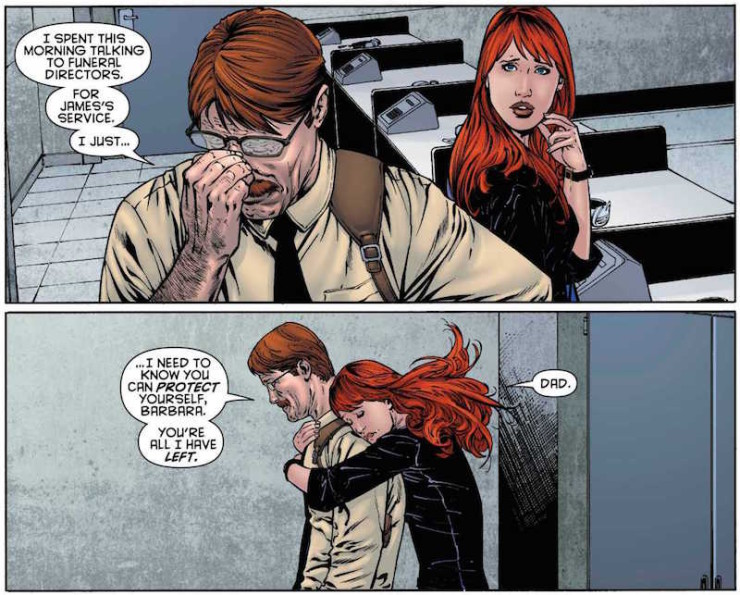
For every foot of Gotham that Commissioner James Gordon takes back from the city’s criminals, his family moves incrementally away from him: His wife divorces him (or tries to kill him, depending on the story); his daughter Barbara is used as a pawn, shot by the Joker in The Killing Joke with the sole intent of driving Jim insane; and his son James, Jr. is a full-blown psychopathic murderer who delights in showing his father just how much the Gordon family has fragmented. As long as Jim works to keep the city safe, his family will inversely be more unsafe, yet he never stops sending out the Bat-signal when needed.
But there’s some hope, as he and Barbara reconcile in the small ways they can: training at the shooting range, working together (knowingly or not) with Batman. Jim has two families—the Gordons and Gotham—and he does everything in his power to protect both of them. Even when they tear each other apart. –Natalie
Gomez Addams (The Addams Family films)
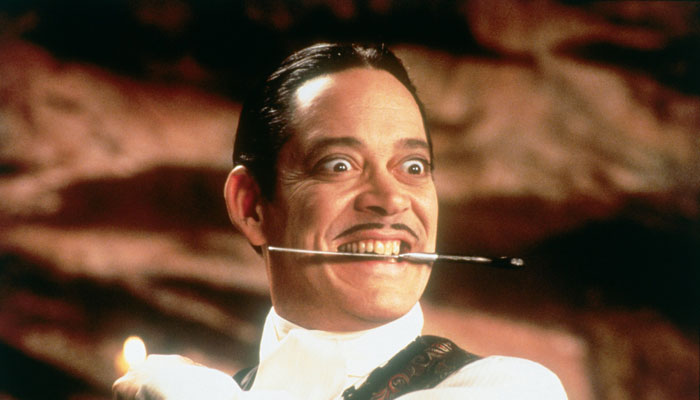
Sure, he condones murder and torture, but really only to those who kind of have it coming (or are too dumb to avoid one of Pugsley’s bear traps). For the most part Gomez Addams, as portrayed by Raul Julia, is a creature of enthusiasm and passion. He wants everyone around him to be the best “them” that they can be, even if that “them” is an unholy shuffle-monster of a brother, or an unscrupulous accountant, or just a hand. Gomez is thrilled when someone reaches beyond their comfort zone, even if they threaten his life by doing so. And he gives everything of himself to make sure his family and friends have a supportive environment in which to grow and enjoy life. Gomez gives so his family can grow. He’d dance the Mamushka while Nero fiddled. He’d dance the Mamushka at Waterloo. He’d dance the Mamushka for Jack the Ripper. But also, sir or madam or Thing, he’d dance the Mamushka for YOU. –Chris
Data (Star Trek: The Next Generation)
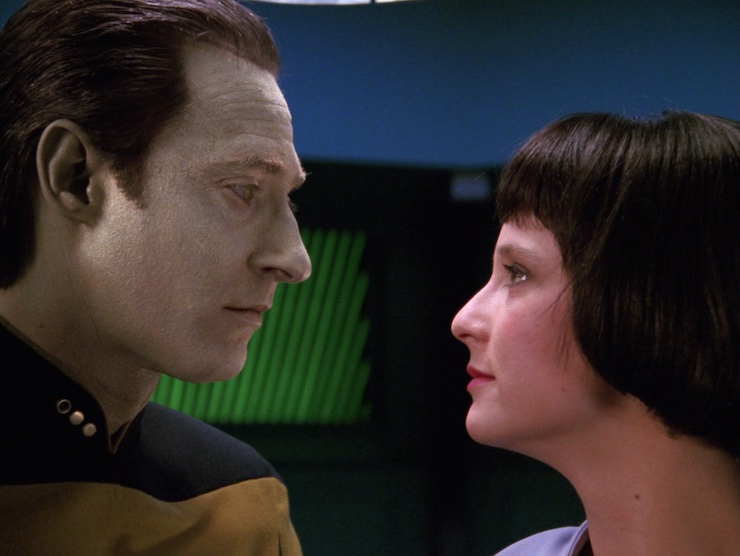
The best dad in all of science fiction is clearly Data. In one of my all-time favorite ST:TNG episodes, “The Offspring”, Data creates a working, sentient Soongian android, and he, the crew, and a Starfleet representative, Admiral Haftel, spend the rest of the episode asking whether this android is his child, or simply a new piece of tech for Starfleet to play with. Like all the best Next Gen episodes, “The Offspring” asks thorny questions about free will, sentience, and the responsibility we have to our fellow creatures. But all that aside: Data’s a great dad! First, he names her “Lal” which means “darling” in Hindi, allows her to choose her own race and gender from several thousand examples he prepares for her, and supports her eventual choice to be a human female. He sends her to school to socialize with other children, and when that doesn’t go well, let’s her have a job in Ten Forward, where Guinan can keep an eye on her. He shuts down Commander Riker before he can get too Riker-y by asking, “What are your intentions toward my daughter?” and, when Lal asks why the two of them should bother trying to be human when they’ll never succeed, he replies:
I have asked myself that many times, as I have struggled to be more human. Until I realized, it is the struggle itself that is most important. We must strive to be more than we are, Lal. It does not matter that we will never reach our ultimate goal. The effort yields its own rewards.
That? That is Grade-A parental advice. When the episode takes a tragic turn, and Lal’s brain suffers a cascade failure, it also seems to trigger her ability to feel real emotions. Data accepts that his daughter has evolved beyond him, takes pride in her growth, and finally uploads her consciousness and memories into his own mind rather than allowing her to fully die. Instead of moving on from what is, essentially, an engineering failure, he chooses to take on the burden of carrying her with him in his own mind. –Leah
Keith Mars (Veronica Mars)
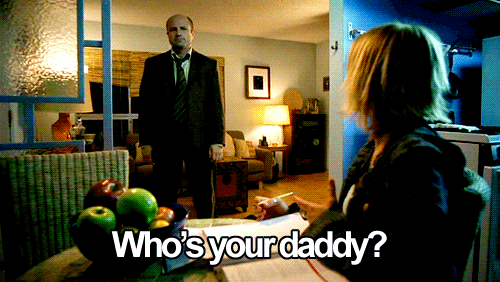
Yeah, I know it’s not sci-fi/fantasy, but Veronica Mars has one of the best dads ever. Private Investigator and former Sheriff Keith Mars is everything a cynical and snarky teen could ask for in a dad: he’s smart, he’s grounded, he tells groan-worthy dad jokes, and he has access to all the best sleuthing databases and gadgetry. His close relationship with Veronica is based on genuine affection and a sense that they both belong in a screwball comedy that happens to be written by Raymond Chandler. But best of all, Keith always remains believably a dad—even when they’re pal-ing around, he’s protective and authoritative and completely justified in worrying over Veronica’s extracurricular investigations. I mean, she did get herself locked in an ice chest during an attempted arson… Veronica, I hope you send Keith some very nice golf clubs this year for his troubles. –Sarah
Jonathan Kent (All-Star Superman)
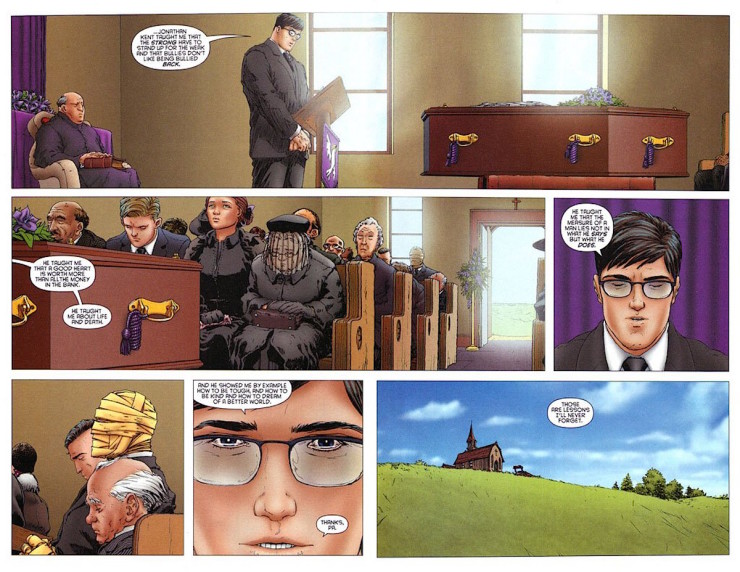
The above spread from Grant Morrison and Frank Quitely’s All-Star Superman says it all. –Chris
Originally published in June 2016.










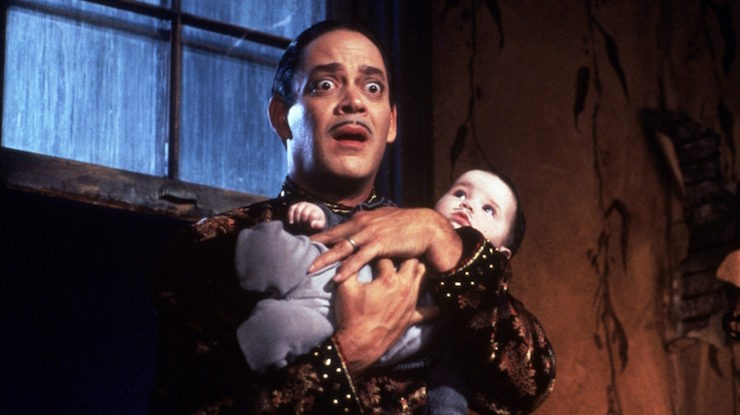
Gomez is the best (although his alternate company counterpart, Herman Munster, is still up there too) and one of the best tv dad episodes ever was one where he befriended a troubled young biker rebel (Episode: “The Addams Family Meets a Beatnik”) and while he never quite understood the young man looking for a father figure, he did his best to be understanding and eventually they reconciled him with his disapproving real father. And that was in a half hour comedy!!
I was gonna try and add a great dad from Anime and Manga, but they all… Kinda sucked. I mean sure Gendo Ikari managed to have two kids who piloted giant robots to save the world, but he did it by being evil. And Genma Saotome has his Son/Daughter as the world’s best martial artist, but he did it in a way that even the Spartans would think was a bit too much and full on. And those are two of the better ones…
Tam al’Thor was a great dad; but from that group; I’d rather have been raised by Abell Cauthon; he seems to have given a more rounded and useful kind of upbringing.
@random22 For Best Anime Dad, I present to you Maes Hughes from Fullmetal Alchemist. He’s so devoted to his little girl, ready to do anything for her and to gush about her to anyone within hearing range. He’s also a good father figure to the Elric brothers, giving them support, advice and peaceful dinners at his home, which is a nice bit of stability two teens in the military desperately needed.
Isshin Shiba-Kurosaki, says the Teen. Yeah, he’s a loony old goat, but he’s still trying to be a Dad.
Howl Jenkins, from Howl’s Moving Castle and sequels.
How could you forget Walter from Fringe? (I do have to admit that I am in the midst of a Fringe binge right now.)
You should definitely add Dalinar Kohlin. Of course we learned in the latest book that he had serious issues in his younger days, but the redemption arc he went through is a great example of a dad working to do better, which I think is a halmark of great dads.
How could you forget Aral Vorkosigan!
One omission. I feel is Jeff Tracy. Fathered five sons who he raised single handed after the death of his wife. Jeff provided both mentoring and example in development into courageous, compassionate and centered young men. He set a vision and bond that has kept the family close as in the original series and beyond even in his absence in the reboot. Perhaps more so as Jeff Tracy is as much an integral part of the Tracy family and a guiding light in the familyʻs life and mission as ever he was in the first series.
Aral Vorkosigan, hands down!
“You’d throw away your home for this?!”
“My home is not a place. It is a person, sir,” Aral said gravely. Then added reluctantly, “People.”
Excerpt From: Lois McMaster Bujold. “Barrayar (Vorkosigan Saga).” iBooks. https://itunes.apple.com/us/book/barrayar-vorkosigan-saga/id687545292?mt=11
@3
I remember seeing a fanart of Elicia grown up (~20s), pulling out a Maes-style wallet with a zillion pictures of Maes and gushing about her daddy. It was the most adorable thing I’ve ever seen.
I second Aral Vorkosigan and add the father in Robert Heinlein’s immortal The Rolling Stones.
Studio Ghibli has some great dads.
Kiki’s Delivery Service: Her dad, Okino, is loving and kind, and willing to help her follow tradition in taking her gap year at 13 even though he really wishes it weren’t so soon. The bakery owner’s husband, who I don’t think ever gets a name (and just sorta grunts), is a father-to-be and has his own concerns; nevertheless, he not only agrees to rent to Kiki, but also steps into the role of on-site dad.
Whisper of the Heart: Seiya Tsukishima understands that his daughter Shizuku is in the throes of creation and aids her efforts, even though conventionally she should be concentrating on something else.
My Neighbor Totoro: Professor Kusakabe uncomplainingly shoulders the burden of being sole parent on site while holding down a full-time commuter job, moving into a new house in a new community, and worrying about his sick wife. What’s more, he is gentle and respectful with his young daughters and never quashes their sense of wonder.
In InuYasha, Inu no Taisho manages to be a better father dead than some are alive, just through the inheritances he left his sons.
Prideful and cruel prince Sesshoumaru gets Tenseiga, the Sword of Heaven, which can harm no living thing, but can heal wounds and diseases and even restore life to the fallen.
InuYasha, the half-breed bastard, doomed to be an outcast for life, gets Tessaiga, the Sword of the Fang, which can slay a hundred enemies in a single swing –but which can only be wielded in defense of the weak.
(And Sounga, the Sword of Hell, gets sealed away so no-one can be tainted by its curse.)
Javier Perez de Gras devotes himself to supporting his severely disabled daughter Nancia in Anne McCaffrey’s ‘PartnerShip’. Possibly at the cost of his other two children. Unfortunately he decides to try to redress the balance at just the wrong moment and when the plum mission he gets Nancia for her first trip out as a brainship goes sideways he isn’t there to advise her.
Can’t leave out Uncle Ben. His lessons are what make Spider-Man the best hero in the Marvel Universe.
That dang TNG episode…. 28 years since I first saw it air and it still makes me cry every dang time, I’m not ashamed to admit. When Lal tells Data she loves him and he says he cannot feel it and she tells him that she’ll feel it enough for them both… it just gets me. Having lost my own dad a couple of years ago, and him being the one who got me into Star Trek (and fantasy literature generally), this whole artictle resonates for me a little more that it might have earlier.
I agree with #1. Restricting Gomez Addams to the movie version is to lose the wonderful multi-season father than was John Astin. Plus he’s Samwise’s dad!
Disagree about Stoic.. I love the movie, and like things about him, but a great dad he was not.
@18,
Hmm, I guess then you’re not going to agree with my suggestion of Agamemnon from The Butlerian Jihad either. :)
@5:
How could you include Walter from Fringe? Walternate was, perhaps, a better dad, but both were train wrecks with their own family, and borderline evil with the children they were given care over in the 70s and 80s.
Keith Mars was a breath of fresh air, given the kinds of dads portrayed on television in the 90s and 2000’s.
I know there’s a lot of disagreement regarding Joe West from The Flash, but for my money, that is one fantastic dad.
Also, another second for Aral Vorkosigan.
Aral Vorkosigan, Herman Munster & Gomez Addams (TV versions), Roger Stone, Nathan Bridger from seaQuest who buried one son but found a second one in Lucas, Baslim in Citizen of the Galaxy, Commander Adama in BSG, Jonathan Kent from both Smallville and Lois and Clark